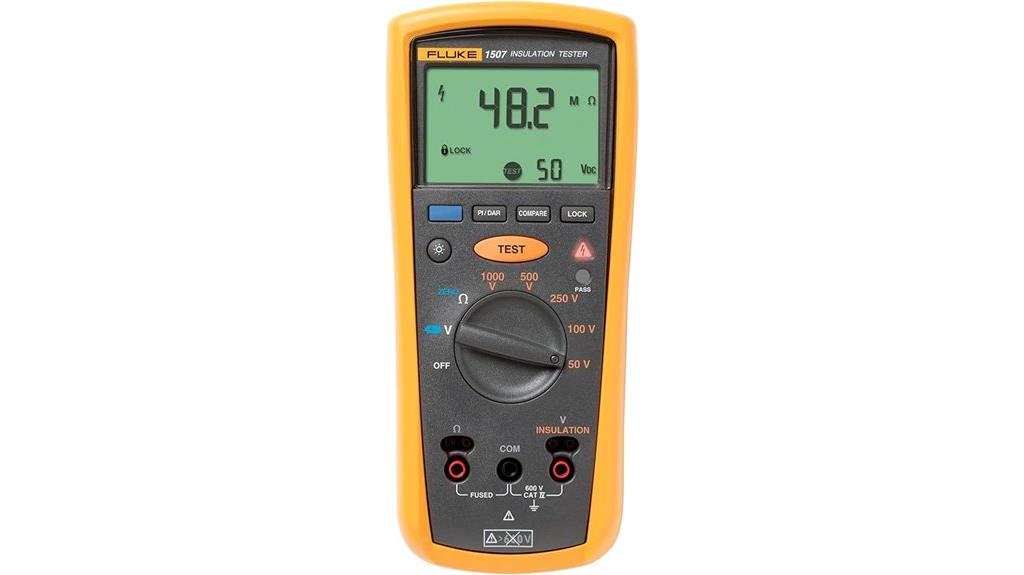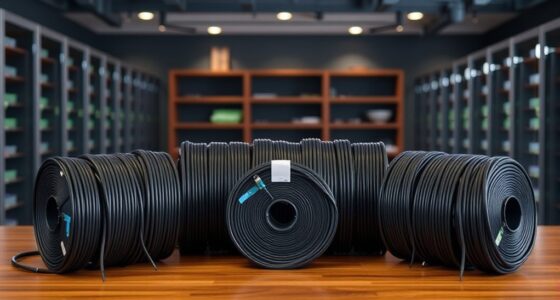When selecting an insulation resistance tester, you need tools that deliver precise and reliable results every time. The market offers several top models designed for professionals like you, but choosing the right one can be challenging. With so many features and safety standards to consider, it’s essential to understand which testers stand out in 2025. Keep reading to discover the best options that balance performance, durability, and ease of use.
UEi IRT807 Insulation Resistance Tester

If you’re looking for a reliable insulation resistance tester that combines accuracy with ease of use, the UEi IRT807 is an excellent choice. It measures insulation resistance up to 2GΩ and voltage testing up to 1000V AC/DC, with multiple voltage options and a broad resistance range. The device offers precise readings with an accuracy of ±1.5-3% + 5 digits within 0.01MΩ–500MΩ. Built for safety, it features a CATIV rating up to 600V and CATIII up to 1000V. Its durable design includes a protective rubber boot, an easy-to-read backlit LCD, and convenient testing features like auto power-off and multiple measurement modes.
Best For: professionals and technicians needing a reliable, accurate insulation resistance tester with versatile testing options in challenging environments.
Pros:
- Measures insulation resistance up to 2GΩ and voltage up to 1000V AC/DC for comprehensive testing.
- Certified with CATIV up to 600V and CATIII up to 1000V, ensuring safety during use.
- Features an easy-to-read backlit LCD, auto power-off, and built-in work light for convenience in low-light conditions.
Cons:
- May be more expensive compared to simpler insulation testers with fewer features.
- Requires 4 AA batteries, which may need replacement over time.
- The device’s size and advanced features might be overwhelming for casual or infrequent users.
Digital Insulation Resistance Tester with Backlight LCD Display

The Digital Insulation Resistance Tester with Backlight LCD Display is ideal for professionals and DIY enthusiasts working in low-light environments or tight spaces. Its high-definition backlight LCD ensures clear readings even in darkness, with a data hold function for convenience. The device measures insulation resistance up to 2000MΩ, voltage from 250V to 1000V, and AC/DC voltage up to 750V/1000V. Its lightweight plastic body and adjustable shoulder strap make it portable and easy to handle. Safety features include voltage warning alerts and high-voltage indicators. While the device offers reliable testing, upgrading to higher-rated test leads is recommended for increased safety during high-voltage measurements.
Best For: professional electricians, electrical technicians, and DIY enthusiasts needing accurate insulation and voltage testing in low-light or confined environments.
Pros:
- Equipped with a high-definition backlight LCD display for clear readings in darkness
- Measures insulation resistance up to 2000MΩ and voltage up to 1000V, suitable for various electrical testing needs
- Compact, lightweight design with an adjustable shoulder strap enhances portability and ease of use
Cons:
- Original test leads may not be rated for high-voltage safety; upgrading to higher-rated leads is recommended
- Battery compartment design with screw closure can be vulnerable to wear over time
- Measurement accuracy at the highest voltage range (1000V) may be out of specification, affecting precise readings
MH13 Digital Insulation Resistance Tester (1MΩ-200GΩ, LCD, Auto Range)

Designed for electrical professionals, the MH13 Digital Insulation Resistance Tester stands out with its wide measurement range from 1MΩ to 200GΩ, ensuring accurate testing of insulation integrity across various devices. You can easily switch output voltage among 250V, 500V, 1000V, 2000V, and 2500V, supporting versatile testing scenarios. Its LCD backlit display provides clear readings, even in low-light conditions. With features like automatic discharge, absorption ratio, and polarization index, this tester offers reliable results for transformers, motors, cables, and switches. Durable and portable, it’s perfect for maintenance tasks, though it’s less effective for detecting resistance below 2MΩ.
Best For: electrical professionals and maintenance technicians needing reliable insulation testing across high resistance ranges and versatile voltage settings.
Pros:
- Wide measurement range from 1MΩ to 200GΩ for comprehensive insulation testing
- Easy to operate with LCD backlit display and multiple voltage options for versatile applications
- Durable construction with moisture and dust resistance, suitable for field use
Cons:
- Less effective for measuring resistance below 2MΩ, with values potentially reading as zero
- Minimum output voltage of 250V may not suit all low-resistance testing needs
- Some user feedback indicates issues with cable quality and labeling accuracy
Fluke 1507 Digital Megohmmeter for Electrical Insulation Testing

The Fluke 1507 Digital Megohmmeter stands out as an ideal choice for professionals conducting advanced industrial and electrical insulation testing, thanks to its wide range of test voltages from 50 V to 1000 V. You can perform repetitive or hard-to-reach tests easily with the remote test probe, and safety is enhanced by live circuit detection that prevents testing if voltage exceeds 30 volts. Its large, backlit display makes readings clear, while automatic calculations of polarization index and dielectric absorption ratio save you time. Designed for complex environments, the Fluke 1507 offers versatility, safety, and precise measurements for reliable insulation testing.
Best For: professionals in industrial and electrical fields seeking precise, versatile insulation testing with safety features and user-friendly operation.
Pros:
- Wide range of test voltages from 50 V to 1000 V for versatile applications
- Live circuit detection enhances user safety during testing
- Automatic calculations of polarization index and dielectric absorption ratio improve efficiency
Cons:
- May be more complex for casual or infrequent users unfamiliar with advanced testing features
- Larger size could be less convenient for portable use in tight spaces
- Higher cost compared to simpler insulation testers with fewer features
UNI-T 2500V Insulation Megger Tester

If you’re looking for a reliable insulation tester that offers high accuracy and versatility, the UNI-T 2500V Insulation Megger Tester (UT502A) is an excellent choice. It measures insulation resistance from 0 Megohm to 20 GΩ using AC voltages of 500V and 1000V. The device features an LCD display with backlight, alarm alerts, and supports automatic measurements, PI, DAR, and resistivity calculations. Its multi-functional capabilities include low resistance, AC voltage, and insulation testing, making it suitable for testing transformers, cables, motors, and more. Designed for stability and ease of use, the UT502A ensures comprehensive diagnostics for professional electrical maintenance.
Best For: Professional electricians and maintenance personnel seeking a reliable, versatile insulation tester for diagnosing electrical equipment safety and performance.
Pros:
- High measurement range from 0 Megohm to 20 GΩ for comprehensive insulation testing
- Supports multiple functions including PI, DAR, resistivity calculations, and AC voltage measurement
- Easy-to-read LCD display with backlight and alarm indicators for clear operation
Cons:
- Limited to AC testing voltages of 500V/1000V, which may not cover all testing requirements
- Requires familiarity with electrical testing procedures for optimal use
- Battery life may need monitoring during extensive testing sessions
Factors to Consider When Choosing an Insulation Resistance Tester
When selecting an insulation resistance tester, you need to consider key factors like voltage range options and resistance measurement limits to ensure it fits your applications. Safety certifications are crucial for reliable operation and user protection, while ease of use can save you time during testing. Additionally, durability and build quality determine how well the tester will hold up in demanding environments.
Voltage Range Options
Choosing the right voltage range on an insulation resistance tester is crucial to obtaining accurate results and ensuring safety. The voltage options typically range from 250V to 2500V, with higher voltages suited for industrial equipment. Selecting a voltage that matches the operational voltage of your equipment ensures reliable testing and prevents damage. Lower ranges, like 250V, are ideal for sensitive electronic components, while higher ranges, such as 1000V or more, are necessary for heavy-duty electrical systems. Some testers offer multiple preset voltage options, providing versatility for different applications and standards. Using an appropriate voltage range not only improves measurement accuracy but also helps maintain insulation integrity and comply with safety regulations during testing.
Resistance Measurement Limits
Understanding the resistance measurement limits of an insulation tester is essential for selecting the right device for your needs. Most testers can measure resistance up to 2 GΩ, but some specialized models reach 200 GΩ for high-resistance applications. The minimum measurable resistance usually starts around 0.01 MΩ, though some units struggle to detect resistances below 2 MΩ. For accurate readings of high resistance insulation, higher testing voltages—like 1000V or more—are recommended. Conversely, lower voltages may not provide reliable results for certain materials. Your choice should consider the range needed for your equipment’s insulation quality. Proper test leads and calibration are crucial when approaching the upper measurement limits to ensure accuracy and reliable results.
Safety Certifications Needed
Selecting an insulation resistance tester with proper safety certifications is vital to ensure safe and reliable measurements. Look for certifications like CATIII or CATIV ratings, which indicate the device’s protection level against electrical faults. Certifications such as IEC 61010-1 confirm the tester complies with international safety standards for electrical testing equipment. A tester with overload protection and clear safety warnings helps prevent accidents during high-voltage tests. Certification labels show the device has passed rigorous safety tests, including insulation integrity and shock prevention. Choosing a tester with appropriate safety certifications reduces the risk of injury and equipment damage. Always verify that your insulation resistance tester meets these standards before use to ensure both your safety and accurate results.
Ease of Use
Ease of use is essential when selecting an insulation resistance tester, as it ensures accurate results and minimizes user error. An intuitive interface with a clear, backlit LCD display makes operation straightforward, even in low-light conditions. Features like automatic test procedures, including PI and DAR calculations, allow you to perform comprehensive tests without manual math, saving time and reducing mistakes. An ergonomic design with accessible buttons and clearly labeled controls improves usability for both seasoned technicians and beginners. Safety features such as high voltage warning lights and automatic discharge functions help you operate confidently and reduce the risk of accidents. Additionally, a portable, lightweight build with protective boots ensures ease of handling across various environments, making testing more efficient and less cumbersome.
Durability and Build
A durable insulation resistance tester is essential for reliable performance in demanding environments. Look for a device with a rugged construction, such as a protective rubber boot, to withstand drops and impacts. The casing should be made from high-quality plastics like ABS, which resist scratches, moisture, and corrosion. An IP rating is crucial; higher ratings indicate better resistance to dust and water, making the tester suitable for outdoor or industrial use. Ensure the test leads and connectors are reinforced and rated for high voltage to guarantee safety and long-term durability. Additionally, a solid build with secure battery compartments and protected circuitry helps prevent malfunctions and extends the device’s lifespan. Prioritizing durability ensures your tester remains reliable, even in tough conditions.
Data Storage Features
Data storage features are critical when choosing an insulation resistance tester because they enable you to record and review measurement results over time. With these features, you can save hundreds or even thousands of test readings, making it easier to track performance and identify trends. Many models include functions for browsing, deleting, and exporting data, streamlining report generation and record-keeping. Some testers support automatic data logging during testing sequences, providing real-time, continuous data collection without manual input. Reliable data storage ensures you maintain accurate records for maintenance audits, troubleshooting, and regulatory compliance. By choosing a tester with robust storage capabilities, you ensure your testing process is efficient, organized, and audit-ready, saving you time and reducing errors in data management.
Cost and Warranty
When selecting an insulation resistance tester, considering the cost and warranty can significantly impact your overall investment and peace of mind. Budget models start around $50, while professional-grade units can exceed $1,000, depending on features and accuracy. Keep in mind, accessories and test leads are often sold separately, which adds to the total expense. Many high-quality testers come with warranties spanning from 6 months to 3 years, signaling confidence in their durability and reliability. A longer warranty can save you money on repairs and reduce worry during frequent or critical testing. By balancing cost with warranty coverage, you ensure you choose a device that offers both value and peace of mind for your specific needs.
Conclusion
Choosing the right insulation resistance tester ensures accurate readings and safe operations. Consider factors like measurement range, safety certifications, and ease of use to find the best fit for your needs. The models listed here—like the Fluke 1507 or UNI-T 2500V—offer top-notch reliability and durability. Investing in a quality tester not only safeguards your equipment but also boosts your confidence in diagnostics, making your work safer and more efficient in 2025.








